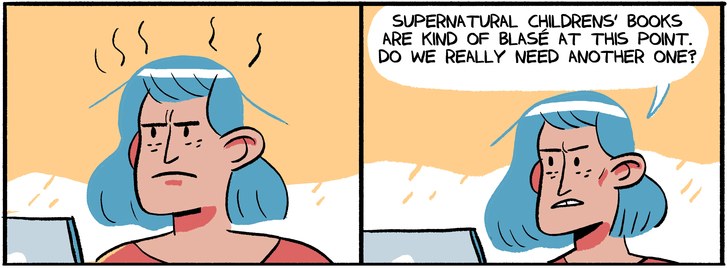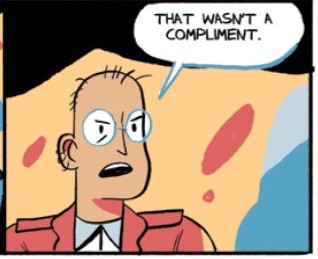Some books are timely, in that they are published at totally the right moment. Dietland by Sarai Walker, for example, with its angry activists fed up with waiting to be treated like humans. Other books reflect a bygone time but still feel relevant, like Mimi Pond’s Over Easy, a smartly written look at 1970s youth culture. Then there are books that are walking on ground so trodden by previous works that the path is practically covered in road markers on how to go about things. Cannonball by Kelsey Wroten is such a work.

Published in 2019, Cannonball is a graphic novel that offers nothing new or unique. A twenty-two year-old lesbian named Caroline has graduated from college and is trying to be a writer. The back of the book says the character is an “art school graduate,” which I thought meant painting, drawing, etc., so I was confused. Her best friend, Penelope, likes to remind Caroline what a stuck-up Jerk Caroline is.

And it’s true. Caroline has zero perspective but always plays the victim. Though she has a crap apartment, she refuses an offer to apply as a copywriter because “I dunno man, that’s not for me. I’ve got my novel to think about.” Ugh. It’s easy to hate Caroline, so it’s hard to get invested in her story. I chose to DNF Cannonball at 50 pages. A published author has a platform to speak a truth, even in fiction, and authors who reinforce stereotypes instead are the worst. Caroline is exactly the person older generations hate when they think about twenty-somethings today.
There are already so many better-crafted books about artists trying to become adults, ones that explore alcohol and drug use just the same, ones with the jaded best friend and the protagonist who is the creator of her own demise but wants pity for her self-loathing. And I guess I just don’t care about people who are twenty-two and lament being young “old.” Because Caroline does.
Wroten might have done something interesting with her well-trodden plot if she had been more innovative with her drawing style and color choices. Instead, the drawings look lazy, there is an awkward color palette of golden-rod/red-orange/hazy blue that didn’t make sense to me. Penelope looks like Charlie Brown meets Mr. Potato Head sans mustache. I didn’t get it.

If you’re looking for a graphic novel with queer people at the center, I’d recommend Fun Home by Allison Bechdel. If you want a graphic novel about art school, try Little Fish by Ramsey Beyer. And for a look at young people who are not innocent but have interesting personalities to read about, try both Over Easy and the follow-up book The Customer is Always Wrong by Mimi Pond.

What a shame! I agree, I’m also not a fan of the artwork.
LikeLike
Is it not the ugliest color palette you’ve ever seen?? I mean, artists study the color wheel, and I feel like Wroten must have napped during that lesson.
LikeLiked by 1 person
Absolutely! 🙂
LikeLike
Glad you chose to DNF rather than keep going. I have a couple graphic novels I won in a giveaway that seem interesting enough.
LikeLike
Aw, nice! What are they?
LikeLike
Yikes, that is unfortunate. And also unfortunate that the author doesn’t have enough sense to realize that people don’t want to read about 20 year olds complaining they are old. Was she trying to be ironic?
LikeLike
I have no idea if she was trying to be ironic. It didn’t feel like it. I mean, playful irony needs to clearly poke at itself, and I felt more like we were supposed to follow the main character to the depths of despair. I think that some women take autonomy so seriously that they become horrible people and believe we should all respect that. I say women and not men and women because women are the one’s fighting for autonomy in a way men don’t have to. It’s almost like we’re new at it. We’re just not saying we don’t have to smile if we don’t want to.
LikeLiked by 1 person
yes, I know what you mean!
LikeLike
I have a 10 yo grandson who says he wants graphic novels in the future. He’s a good reader so it’s not just a kid opting for comics (which I would devour at friends’ places because I wasn’t allowed to buy them). His older sister (16) is pretty street wise and has been working at macca’s. I enjoyed revisiting your Customer is never right, which I thought she might appreciate, but $50 shipped to Australia.
LikeLike
What about this seller from Australia Amazon? https://www.amazon.com.au/Customer-Always-Wrong-Mimi-Pond/dp/1770462821/ref=sr_1_1?keywords=mimi+pond&qid=1573939964&sr=8-1
Lynda Barry has some great graphic novels on there, too.
This One Summer is available at Australia Amazon, too: https://www.amazon.com.au/This-One-Summer-Mariko-Tamaki/dp/1626720940/ref=sr_1_3?keywords=mariko+tamaki&qid=1573940413&sr=8-3
Let me know if you want more recommendations!
LikeLike
Thanks Melanie. 30-40 bucks is what we always pay over here (annoying that it’s coming from Book Depository UK). I’ll update you after Christmas.
LikeLiked by 1 person
If he’s 10, he’d probably love anything by Dave Pilkey. Kids are nuts over that guy in the U.S. I must confess his titles don’t inspire much hope in adult readers — Dog Man and Captain Underpants being two popular series.
LikeLike
Good for you for not finishing. Lots of other great books to get to.
LikeLike
When people tell me they HAVE to finish a book, I get this look of horror on my face. I used to finish all the books because I thought it meant I was dumb if I didn’t.
LikeLiked by 1 person
I think a lot of people have this sense of guilt if they don’t, too. I’m glad I got over that!
LikeLiked by 1 person
This sounds tedious! And I agree, the artwork is nothing to write home about.
LikeLike
The artwork is like an old house that no one has lived in for decades and needs a full remodel.
LikeLike
I find it difficult to DNF a graphic novel — they are often so easy to read, I’ll keep going on even if I am not super into the story. But, I have a lot of friends who are comic artists of some variety, so I feel like finishing these books are important to honoring them and their craft.
I like the color scheme and drawing style — but I’d like it more if this was a book set in the 80s not the 10s. The art gives me a dated, retro vibe. I like it when the art reflects what the comic is trying to say, or deepening the reader’s experience in the world. Like in Persepolis — this feels dated, but dated due to the author’s experiences, not the world around her. I love it.
What inspired you to pick up this book?
LikeLike
There is a weird 60s vibe, to me, in the color scheme of Cannonball. I just thought the color scheme didn’t fit the time period, the characters, and, weirdly, it didn’t match the cover, which made me think the author had one idea and went with another.
The character was so insufferable that I started to feel vile, and I don’t want to hate. But I seriously hated her. As a person trained in creative writing, I think the story aspect is so important too, and this author’s choices made me feel like she didn’t respect the history of “adulting” novels that have come long, long before hers.
I picked up this graphic novel because it was on the end display of the graphic novel section, which typically means it’s new. It is.
LikeLiked by 1 person
Graphic novels are soooo in right now, but they take a lot of time and effort to create. I wonder if the author just slapped something together in order to tell her story, or if her editor didn’t take the time to help her craft something stronger or more meaningful. I also wonder if you were more critical because of your background — I don’t think I would have noticed some of the same things you did. Either way, a pass for me.
I’m so thankful that you are willing to write book reviews for the books you didn’t like as much. It helps the rest of us avoid less than desireable reading!
LikeLike
I’ll review a book I didn’t finish if I have concrete criticisms for why I didn’t finish it. Sometimes a book simply “isn’t for me,” and those I don’t review. Nick and I have been reading and discussing sequential art for a long time, and I’ve written papers on them, too. I think we just have this more academic way of approaching the genre, and I’m critical of storytelling that doesn’t do anything. I just feel like if an artist or writer wants their voice heard, they’re responsible for what message they put out.
LikeLike
“Charlie Brown meets Mr. Potato Head sans mustache.” I can’t unsee it, lol! I’m sorry to see this was such a disappointment. I appreciate the additional recommendations at the end of the post though, I absolutely second your rec of Fun Home, which I loved!
LikeLike
Did you ever read Bechdel’s follow-up memoir, Are You My Mother? It’s on my back burner because I’m worried it’s just more of the same emotions/story as opposed to something quite different from her life.
LikeLiked by 1 person
I didn’t even know there was a follow-up! I was vaguely aware that Bechdel had written more but hadn’t really looked into the rest of her work- I’ll have to check that out! If it does look similar to Fun Home I probably won’t be reading it immediately either, but I liked that one enough to give any sequel a chance.
LikeLiked by 1 person